情态动词用法归纳与练习
- 格式:doc
- 大小:53.50 KB
- 文档页数:8

情态动词用法总结及相应练习在英语中,情态动词属于助动词。
除了作简略回答外,它们一般不能单独使用,它们必须与动词原形一起使用构成句子的谓语。
不同的情态动词会有不同的意义和用法。
有时,同一个情态动词在不同的语境中也会产生不同的含义。
下面我们将讨论这些情态动词的用法。
情态动词的推测性用法和非推测性用法情态动词一般有两种用法:推测性用法(epistemic use)和非推测性用法(non-epistemic use)。
推测性用法是指做出推测,预测事物发生的可能性;非推测性用法则指情态动词本身的基本含义,如XXX表示能力,may表示许可,must和should表示必须和义务,need 表示需要等。
例如:I can swim。
(非推测性用法)This can be true。
(推测性用法)You may go now。
(非推测性用法)He may be ill now。
(推测性用法)You must finish it before lunch time。
(非猜测性用法)He must be at home for he never goes out at dinner time。
(推测性用法)我们把英语中的9大神态动词按其猜测性和非猜测性用法列表如下:情态动词非推测性用法推测性用法can/could能力/许可(ability/n)可能(possibility)may/might许可(n)可能(possibility)will/would意愿(n)预言性(predictability)XXX责任和义务(n)应该是(logical necessity)must责任和任务(n)一定,一定(logical necessity)神态动词非猜测性用法的申明1.may和might透露表现允许may能够与分歧的人称搭配,透露表现“答应、允许”。
比方:May I know your name?You may be the first to leave if you are in a hurry。
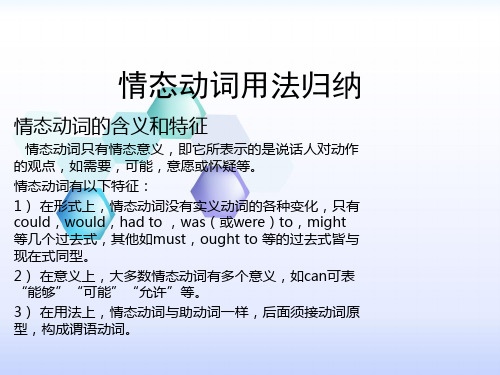
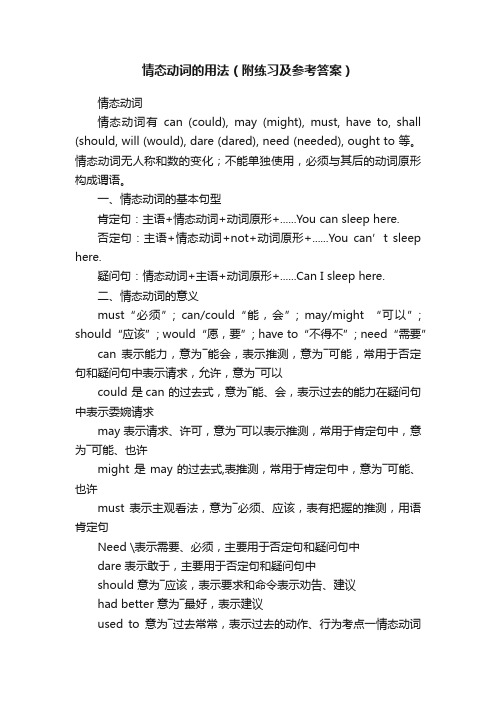
情态动词的用法(附练习及参考答案)情态动词情态动词有can (could), may (might), must, have to, shall (should, will (would), dare (dared), need (needed), ought to 等。
情态动词无人称和数的变化;不能单独使用,必须与其后的动词原形构成谓语。
一、情态动词的基本句型肯定句:主语+情态动词+动词原形+......You can sleep here.否定句:主语+情态动词+not+动词原形+......You can’t sleep here.疑问句:情态动词+主语+动词原形+......Can I sleep here.二、情态动词的意义must“必须”; can/could“能,会”; may/might “可以”; should“应该”; would“愿,要”; have to“不得不”; need“需要”can 表示能力,意为―能会,表示推测,意为―可能,常用于否定句和疑问句中表示请求,允许,意为―可以could 是can 的过去式,意为―能、会,表示过去的能力在疑问句中表示委婉请求may 表示请求、许可,意为―可以表示推测,常用于肯定句中,意为―可能、也许might 是may的过去式,表推测,常用于肯定句中,意为―可能、也许must 表示主观看法,意为―必须、应该,表有把握的推测,用语肯定句Need \表示需要、必须,主要用于否定句和疑问句中dare 表示敢于,主要用于否定句和疑问句中should 意为―应该,表示要求和命令表示劝告、建议had better 意为―最好,表示建议used to意为―过去常常,表示过去的动作、行为考点一情态动词情态动词有具体的词义,但也同助动词一样,需要与其他词语一起构成句子的谓语,另外情态动词没哟人称和数的变化,情态动词后必须跟动词原形。
三、情态动词的基本用法1. can 的用法(1)表示能力、许可、可能性。

情态动词详细用法归纳 Document serial number【KK89K-LLS98YT-SS8CB-SSUT-SST108】情态动词详细用法归纳情态动词有具体的词义,但也同助动词一样,需要与其他词语一起构成句子的谓语,另外情态动词没有人称和数的变化,情态动词后必须跟动词原形。
1. can 的用法:(1)表示能力、许可、可能性。
表示能力时一般译为“能、会”,即有种能力,尤其是生来具备的能力。
如:She can swim fast, but I can’t . 她能游得很快,但我不能。
could是can的过去式。
表示过去的能力。
be able to do sth. 常常指经过努力,花费了时间和劳力之后才能做到某事。
(2)表示许可,常在口语中。
如:You can use my dictionary. 你可以用我的字典。
(3)表示推测,可能性,意为“可能”,常用于否定句和疑问句中,此时can’t 译为“ 不可能”。
如:Can the news be true 这个消息会是真的吗?—Can it be our teacher那个人有可能是我们老师吗?—No, it can’t be our teacher. He is on a visit to the Great Wall.不可能。
咱们老师正在游览长城呢。
【例题】—I think Miss Gao must be in the library. She said she would go there.—No. She be there, I have just been there.A.can’tB.mustn’tC.needn’tD.wouldn’t【解析】根据下文“我刚去过那儿”可知,应为“ 不可能”,can’t 表示推测[答案] A2. could的用法:(1)can的过去式,意为“ 能、会”,表示过去的能力。
如:He could write poems when he was 10. 他十岁时就会写诗。
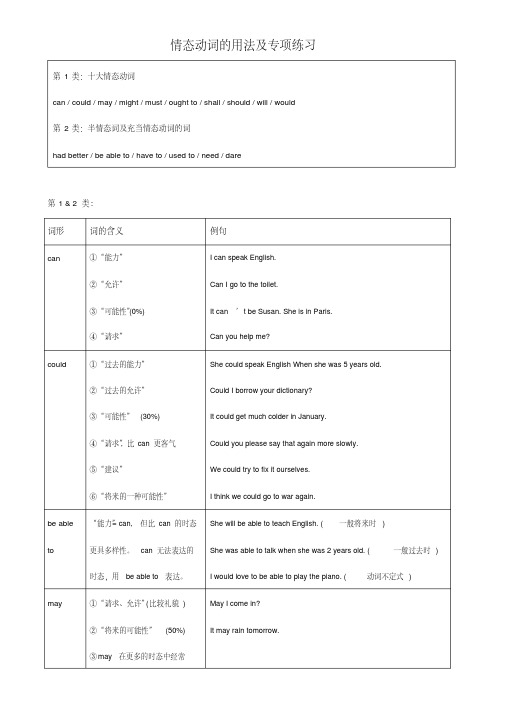
情态动词的用法及专项练习第1 & 2类:词形词的含义例句can ①“能力”②“允许”③“可能性”(0%)④“请求”I can speak English.Can I go to the toilet.It can’t be Susan. She is in Paris. Can you help me?could ①“过去的能力”②“过去的允许”③“可能性”(30%)④“请求”, 比can更客气⑤“建议”⑥“将来的一种可能性”She could speak English When she was 5 years old. Could I borrow your dictionary?It could get much colder in January.Could you please say that again more slowly.We could try to fix it ourselves.I think we could go to war again.be able to “能力”= can, 但比can的时态更具多样性。
can无法表达的时态,用be able to表达。
She will be able to teach English. (一般将来时)She was able to talk when she was 2 years old. (一般过去时)I would love to be able to play the piano. (动词不定式)may ①“请求、允许”(比较礼貌)②“将来的可能性”(50%)③may 在更多的时态中经常May I come in?It may rain tomorrow.第1类:十大情态动词can / could / may / might / must / ought to / shall / should / will / would 第2类:半情态词及充当情态动词的词had better / be able to / have to / used to / need / dare用be allowed to来代替might “较小的可能性”(≤30%)I might move to Canada some day.must ①“必须”(责任、义务)②“可能性”(推测) (100%)③“禁止”(否定式) Everyone must pay taxes.She didn’t arrive. She must be sick.You mustn’t p l ay with fire. It’s dangerous.have to ①“必须、不得不”(客观上不得不做)②多种时态里面代替“must”,因must只有一般现在,但have to 可以有多种时态。

情态动词的用法总结归纳一、情态动词的定义情态动词(Modal Verbs)用于表示说话人的态度和情感,如可能性、必要性、意愿、推测等。
它们不能独立作谓语,只能与其他动词原形构成谓语。
二、常见情态动词1.can (could) :表示能力、可能性或允许。
2.may (might) :表示许可、祝愿或推测。
3.must :表示必须、义务或推测。
4.shall (should) :表示命令、允诺、建议或推测。
5.will (would) :表示意愿、将来或习惯。
三、情态动词的用法1.基本用法:情态动词+动词原形。
例如:He can swim.(他会游泳。
)2.情态动词无人称和数的变化,即情态动词第三人称单数不加-s。
例如:She may go.(她可以去。
)3.情态动词没有非谓语形式,即没有不定式、分词等形式。
4.情态动词后接动词原形,否定形式是在情态动词后加not。
例如:You mustn't smoke here.(你不可以在这里吸烟。
)5.带有情态动词的疑问句和否定句变换只需将情态动词提到主语前或直接在情态动词后加not。
例如:Can he dance?(他会跳舞吗?)He can't dance.(他不会跳舞。
)6.情态动词可以表示推测和可能性。
例如:It may rain tomorrow.(明天可能会下雨。
)7.情态动词可以表示命令和建议。
例如:You should study hard.(你应该努力学习。
)8.情态动词可以表示习惯和规律。
例如:He will arrive at nine.(他将在九点到达。
)9.情态动词可以与完成时连用,表示对过去的推测和猜测。
例如:She may have gone to the cinema.(她可能去看电影了。
)10.情态动词可以与进行时连用,表示对现在的推测和猜测。
例如:He must be studying in the classroom.(他一定在教室里学习。

情态动词用法归纳(全)情态动词用法归纳情态动词是英语中的一类特殊动词,用于表达情感、态度、能力、推测和义务等。
它们常常用来修饰其他动词,帮助我们表达不同的意思。
在本文中,我们将归纳总结情态动词的用法,帮助读者更好地理解和运用这些动词。
一、态度和情感1. Can (能够)Can用来表示某种态度或情感,常用于表示能力、允许和请求等。
例如:- I can swim. (我会游泳。
)- Can I borrow your pen? (我可以借用你的钢笔吗?)- You can't be serious! (你不可能是认真的!)2. Could (可能)Could用来表示过去的能力、允许和请求等。
它还可以用来表示某种可能性。
例如:- When I was younger, I could run faster. (我年轻的时候跑得更快。
)- Could I ask you a question? (我可以问你一个问题吗?)- It could rain later, so bring an umbrella. (今天后面可能会下雨,所以带上雨伞。
)3. May (可能)May常表示许可、请求和推测等。
它还可以用来表示某种可能性或希望。
例如:- May I use your phone? (我可以用一下你的手机吗?)- It may rain tomorrow. (明天可能会下雨。
)- They may arrive late. (他们可能会迟到。
)4. Might (可能)Might与may的用法类似,但表示的可能性稍微低一些。
例如:- She might be busy. (她可能很忙。
)- I might go to the party, but I'm not sure yet. (我可能会去参加派对,但我还不确定。
)二、能力和推测1. Must (必须)Must用来表示强烈的推断或必要性。


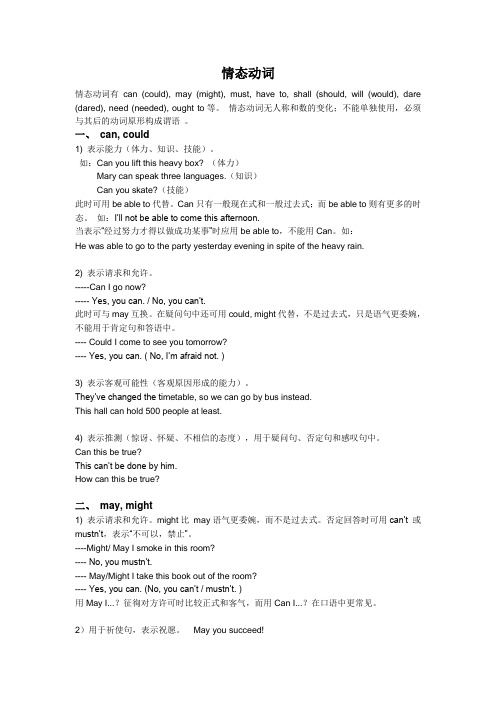
情态动词情态动词有can (could), may (might), must, have to, shall (should, will (would), dare (dared), need (needed), ought to等。
情态动词无人称和数的变化;不能单独使用,必须与其后的动词原形构成谓语。
一、can, could1) 表示能力(体力、知识、技能)。
如:Can you lift this heavy box? (体力)Mary can speak three languages.(知识)Can you skate?(技能)此时可用be able to代替。
Can只有一般现在式和一般过去式;而be able to则有更多的时态。
如:I’ll not be able to come this afternoon.当表示“经过努力才得以做成功某事”时应用be able to,不能用Can。
如:He was able to go to the party yesterday evening in spite of the heavy rain.2) 表示请求和允许。
-----Can I go now?----- Yes, you can. / No, you can’t.此时可与may互换。
在疑问句中还可用could, might代替,不是过去式,只是语气更委婉,不能用于肯定句和答语中。
---- Could I come to see you tomorrow?---- Yes, you can. ( No, I’m afraid not. )3) 表示客观可能性(客观原因形成的能力)。
They’ve changed the ti metable, so we can go by bus instead.This hall can hold 500 people at least.4) 表示推测(惊讶、怀疑、不相信的态度),用于疑问句、否定句和感叹句中。
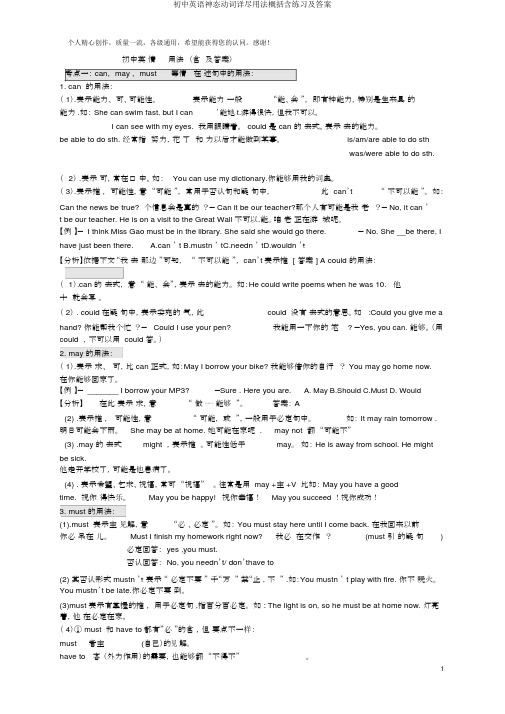
初中英情用法(含及答案)考点一: can, may , must等情在述句中的用法:1. can 的用法:( 1).表示能力、可、可能性。
表示能力一般“能、会”,即有种能力,特别是生来具的能力 .如: She can swim fast, but I can’能她t.游得很快,但我不可以。
I can see with my eyes. 我用眼睛看。
could 是 can 的去式。
表示去的能力。
be able to do sth. 经常指努力,花了和力以后才能做到某事。
is/am/are able to do sthwas/were able to do sth.(2) .表示可,常在口中。
如: You can use my dictionary.你能够用我的词典。
( 3).表示推,可能性,意“可能”,常用于否认句和疑句中,此can’t“ 不可以能”。
如:Can the news be true? 个信息会是真的?— Can it be our teacher?那个人有可能是我老?— No, it can ’t be our teacher. He is on a visit to the Great Wall不可以.能。
咱老正在游城呢。
【例】— I think Miss Gao must be in the library. She said she would go there.—No. She __be there, I have just been there. A.can ’ t B.mustn ’ tC.needn ’ tD.wouldn ’t【分析】依据下文“我去那边”可知,“ 不可以能”,can’t表示推[答案] A could 的用法:(1).can 的去式,意“能、会”,表示去的能力。
如:He could write poems when he was 10. 他十就会写。
( 2) . could 在疑句中,表示委宛的气,此could 没有去式的意思。
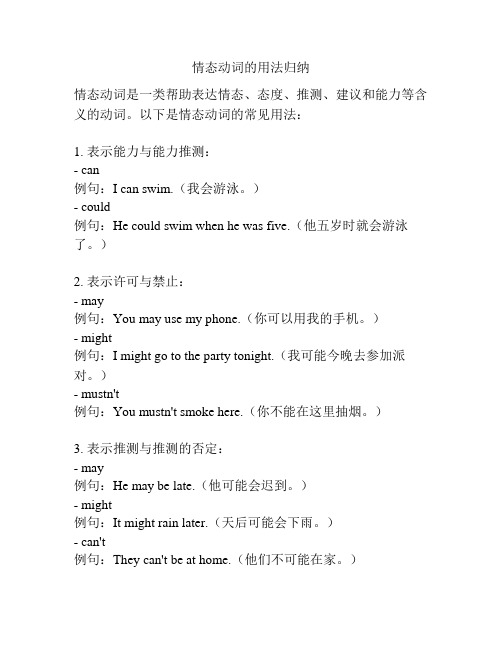
情态动词的用法归纳情态动词是一类帮助表达情态、态度、推测、建议和能力等含义的动词。
以下是情态动词的常见用法:1. 表示能力与能力推测:- can例句:I can swim.(我会游泳。
)- could例句:He could swim when he was five.(他五岁时就会游泳了。
)2. 表示许可与禁止:- may例句:You may use my phone.(你可以用我的手机。
)- might例句:I might go to the party tonight.(我可能今晚去参加派对。
)- mustn't例句:You mustn't smoke here.(你不能在这里抽烟。
)3. 表示推测与推测的否定:- may例句:He may be late.(他可能会迟到。
)- might例句:It might rain later.(天后可能会下雨。
)- can't例句:They can't be at home.(他们不可能在家。
)4. 表示义务与责任:- must例句:We must finish our homework.(我们必须完成作业。
)- have to例句:I have to go to work early tomorrow.(我明天必须早点去上班。
)5. 表示愿望与建议:- should例句:You should exercise regularly.(你应该经常锻炼。
)- ought to例句:They ought to help others.(他们应该帮助别人。
)6. 表示推荐与要求:- would like例句:I would like to have a cup of tea.(我想要一杯茶。
)- need例句:You need to finish this report by tomorrow.(你需要在明天之前完成这份报告。
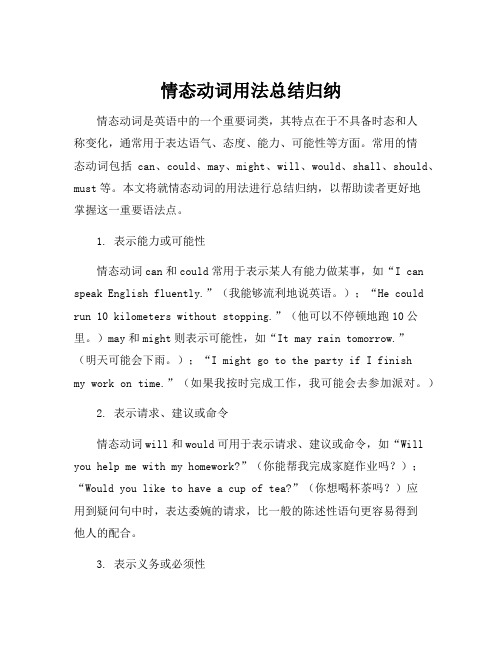
情态动词用法总结归纳情态动词是英语中的一个重要词类,其特点在于不具备时态和人称变化,通常用于表达语气、态度、能力、可能性等方面。
常用的情态动词包括can、could、may、might、will、would、shall、should、must等。
本文将就情态动词的用法进行总结归纳,以帮助读者更好地掌握这一重要语法点。
1. 表示能力或可能性情态动词can和could常用于表示某人有能力做某事,如“I can speak English fluently.”(我能够流利地说英语。
);“He could run 10 kilometers without stopping.”(他可以不停顿地跑10公里。
)may和might则表示可能性,如“It may rain tomorrow.”(明天可能会下雨。
);“I might go to the party if I finishmy work on time.”(如果我按时完成工作,我可能会去参加派对。
)2. 表示请求、建议或命令情态动词will和would可用于表示请求、建议或命令,如“Will you help me with my homework?”(你能帮我完成家庭作业吗?);“Would you like to have a cup of tea?”(你想喝杯茶吗?)应用到疑问句中时,表达委婉的请求,比一般的陈述性语句更容易得到他人的配合。
3. 表示义务或必须性情态动词must和should则表示义务或必须性,如“I mustfinish my project by Friday.”(我必须在周五完成我的项目。
);“You should eat more vegetables.”(你应该多吃蔬菜。
)值得注意的是,must常用于表示说话人的主观判断或要求,而should则表示客观上的合理建议或道义上的规范。
4. 表示推测或推论情态动词may、might和could亦可用于表示推测或推论,如“It may snow in the evening.”(晚上可能会下雪。
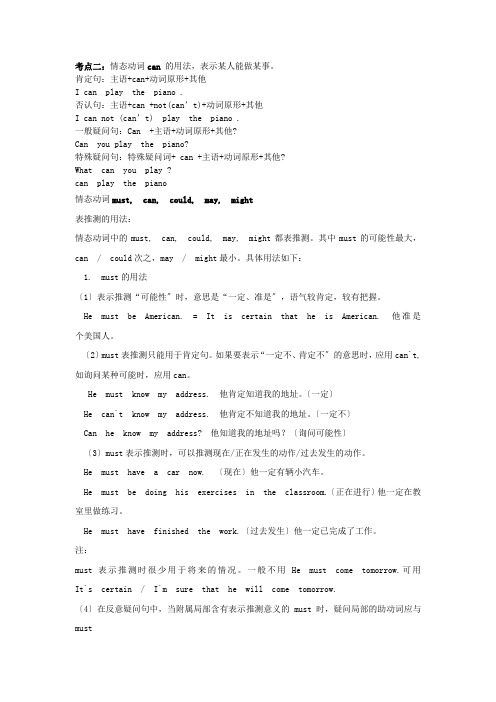
考点二:情态动词can 的用法,表示某人能做某事。
肯定句:主语+can+动词原形+其他I can play the piano .否认句:主语+can +not(can’t)+动词原形+其他I can not (can’t) play the piano .一般疑问句:Can +主语+动词原形+其他?Can you play the piano?特殊疑问句:特殊疑问词+ can +主语+动词原形+其他?What can you play ?can play the piano情态动词must, can, could, may, might表推测的用法:情态动词中的must, can, could, may, might都表推测。
其中must的可能性最大,can / could次之,may / might最小。
具体用法如下:1. must的用法〔1〕表示推测“可能性〞时,意思是“一定、准是〞,语气较肯定,较有把握。
He must be American. = It is certain that he is American. 他准是个美国人。
〔2〕must表推测只能用于肯定句。
如果要表示“一定不、肯定不〞的意思时,应用can`t,如询问某种可能时,应用can。
He must know my address. 他肯定知道我的地址。
〔一定〕He can`t know my address. 他肯定不知道我的地址。
〔一定不〕Can he know my address? 他知道我的地址吗?〔询问可能性〕〔3〕must表示推测时,可以推测现在/正在发生的动作/过去发生的动作。
He must have a car now. 〔现在〕他一定有辆小汽车。
He must be doing his exercises in the classroom.〔正在进行〕他一定在教室里做练习。
He must have finished the work.〔过去发生〕他一定已完成了工作。
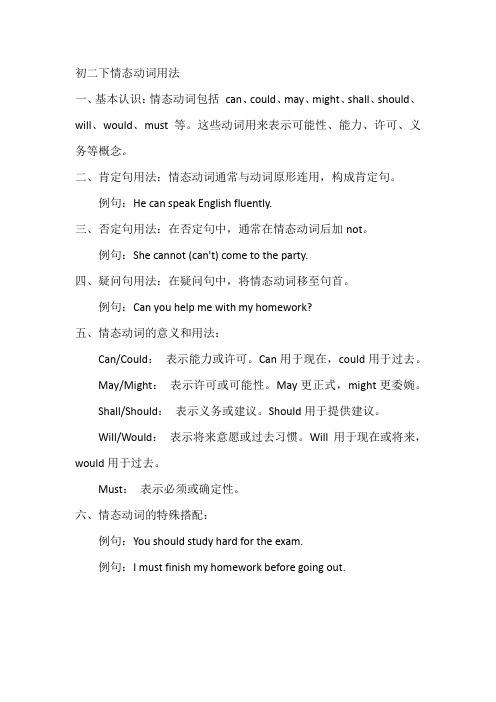
初二下情态动词用法
一、基本认识:情态动词包括can、could、may、might、shall、should、will、would、must等。
这些动词用来表示可能性、能力、许可、义务等概念。
二、肯定句用法:情态动词通常与动词原形连用,构成肯定句。
例句:He can speak English fluently.
三、否定句用法:在否定句中,通常在情态动词后加not。
例句:She cannot (can't) come to the party.
四、疑问句用法:在疑问句中,将情态动词移至句首。
例句:Can you help me with my homework?
五、情态动词的意义和用法:
Can/Could:表示能力或许可。
Can用于现在,could用于过去。
May/Might:表示许可或可能性。
May更正式,might更委婉。
Shall/Should:表示义务或建议。
Should用于提供建议。
Will/Would:表示将来意愿或过去习惯。
Will用于现在或将来,would用于过去。
Must:表示必须或确定性。
六、情态动词的特殊搭配:
例句:You should study hard for the exam.
例句:I must finish my homework before going out.。
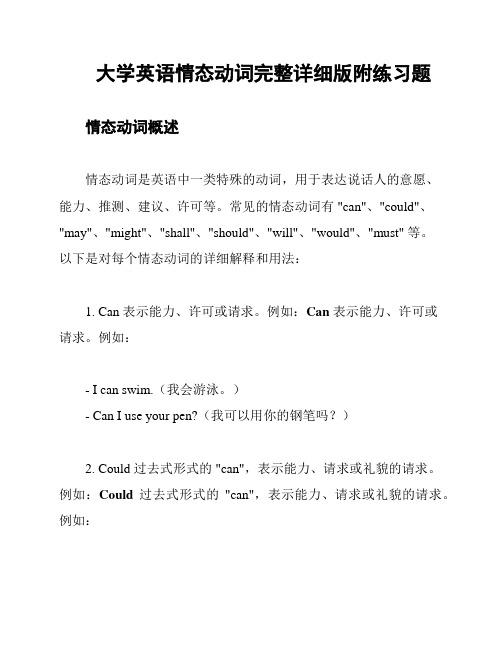
大学英语情态动词完整详细版附练习题情态动词概述情态动词是英语中一类特殊的动词,用于表达说话人的意愿、能力、推测、建议、许可等。
常见的情态动词有 "can"、"could"、"may"、"might"、"shall"、"should"、"will"、"would"、"must" 等。
以下是对每个情态动词的详细解释和用法:1. Can 表示能力、许可或请求。
例如:Can表示能力、许可或请求。
例如:- I can swim.(我会游泳。
)- Can I use your pen?(我可以用你的钢笔吗?)2. Could 过去式形式的 "can",表示能力、请求或礼貌的请求。
例如:Could过去式形式的"can",表示能力、请求或礼貌的请求。
例如:- I could ride a bike when I was five.(我五岁时就会骑自行车了。
)- Could you please open the window?(可以请你打开窗户吗?)3. May 表示许可或推测。
例如:May表示许可或推测。
例如:- May I go to the bathroom?(我可以去洗手间吗?)- It may rain tomorrow.(明天可能会下雨。
)4. Might 过去式形式的"may",表示推测或可能性较小。
例如:Might过去式形式的 "may",表示推测或可能性较小。
例如:- I thought it might be too late.(我想可能太晚了。
)5. Shall 表示将来时态的意愿、建议或命令。
例如:Shall表示将来时态的意愿、建议或命令。
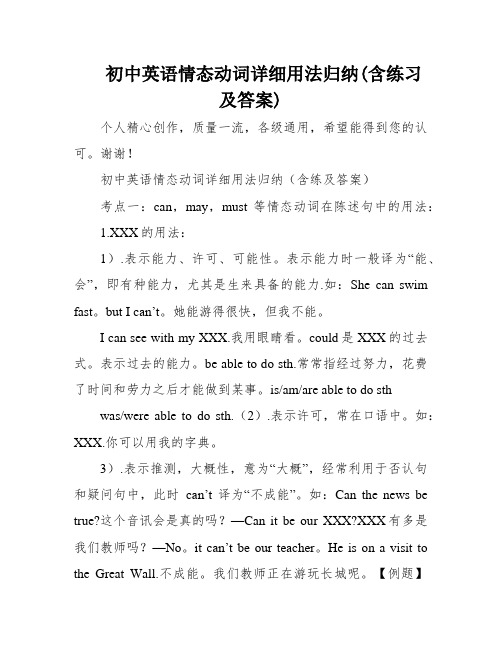
初中英语情态动词详细用法归纳(含练习及答案)个人精心创作,质量一流,各级通用,希望能得到您的认可。
谢谢!初中英语情态动词详细用法归纳(含练及答案)考点一:can,may,must等情态动词在陈述句中的用法:1.XXX的用法:1).表示能力、许可、可能性。
表示能力时一般译为“能、会”,即有种能力,尤其是生来具备的能力.如:She can swim fast。
but I can’t。
她能游得很快,但我不能。
I can see with my XXX.我用眼睛看。
could是XXX的过去式。
表示过去的能力。
be able to do sth.常常指经过努力,花费了时间和劳力之后才能做到某事。
is/am/are able to do sth was/were able to do sth.(2).表示许可,常在口语中。
如:XXX.你可以用我的字典。
3).表示推测,大概性,意为“大概”,经常利用于否认句和疑问句中,此时can’t译为“不成能”。
如:Can the news be true?这个音讯会是真的吗?—Can it be our XXX?XXX有多是我们教师吗?—No。
it can’t be our teacher。
He is on a visit to the Great Wall.不成能。
我们教师正在游玩长城呢。
【例题】—I think Miss Gao must be in the library。
She said she would go there.—No。
She __be there。
Ihave just been there.A.can’tB.XXX’t解析】按照下文“我刚去过那儿”可知,应为“不成能”,can’t表示推测[答案] Acould的用法:1).can的过去式,意为“能、会”,表示过去的能力。
如:He could write poems when he was 10.他十岁时就会写诗。

2016高考专题之情态动词一、基础提高一、常见的情态动词有:can 能may 可以will,would (表意愿)need 须要dare 敢must 必需have to 不得不shall,should 应当(表义务)ought to 应当1.can,could 的用法1.1表实力,有“能”、“会”、“能够”的意思例如:Can you drive a car? 你会开车吗?-----Yes, I can. 我会。
-----No, I can't. 我不会。
1.2表允许,在口语中代替may,有“可以”的意思例如:Can I use your bike?我可以用你的自行车吗?1.3表示可能性,常用于否定句和疑问句例如:Can it be true?那会是真的吗?Today is Sunday. He can't be at school.今日是星期天。
他不行能在学校里。
1.4过去式could表示的语气更加委婉、客气例如:Could I come to see you tomorrow?明天我可以来见你吗?1.5 can 和be able to 的比较1) can 只有一般现在时和一般过去时两种时态(could),其他时态要用be able to的形式例如:I haven't been able to get in touch with her.我始终没能和她联系上。
2) 通常can 和be able to 可以互换例如:He will come if he can.假如可能的话,他确定会来。
2.may,might的用法2.1表示许可或征求对方的许可,有“可以”的意思。
例如:You may go now.你可以走了。
May I use your computer?我用一下你的电脑可以吗?2.2回答以may开头的疑问句有如下表达法:例如:May I smoke here? 我可以在这儿抽烟吗?-----Yes, you may.-----Yes, please.------No, you can't.------No, you mustn't.------No, you'd better not.2.3表示揣测,通常只用于陈述句例如:You may be right.你可能是对的。
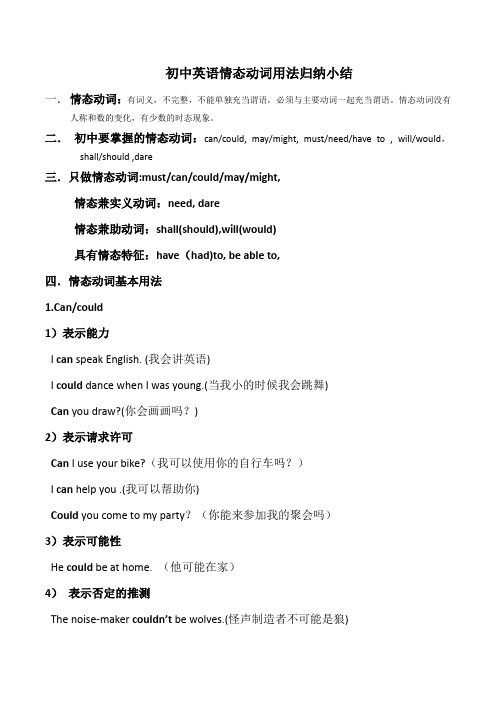
初中英语情态动词用法归纳小结一.情态动词:有词义,不完整,不能单独充当谓语,必须与主要动词一起充当谓语。
情态动词没有人称和数的变化,有少数的时态现象。
二.初中要掌握的情态动词:can/could, may/might, must/need/have to , will/would,shall/should ,dare三.只做情态动词:must/can/could/may/might,情态兼实义动词:need, dare情态兼助动词:shall(should),will(would)具有情态特征:have(had)to, be able to,四.情态动词基本用法1.Can/could1)表示能力I can speak English. (我会讲英语)I could dance when I was young.(当我小的时候我会跳舞)Can you draw?(你会画画吗?)2)表示请求许可Can I use your bike?(我可以使用你的自行车吗?)I can help you .(我可以帮助你)Could you come to my party?(你能来参加我的聚会吗)3)表示可能性He could be at home. (他可能在家)4)表示否定的推测The noise-maker couldn’t be wolves.(怪声制造者不可能是狼)He couldn’t be at home.(他不可能在家)5)表示将来能够要用be able toHe will be able to finish the task in this week.(在这周之内,他将能完成这个任务)2.may/might1)表示许可May/might I use your bike?我可以使用你的自行车吗?(might 更客气)You may come to my home at any time.(你可以在任何时候来我家)2)表示可能性He may/might be ill. 他可能病了。
情态动词用法归纳与练习A: can / could = be able to1 表示能力两种时态can (could),其他时态要用be able to的形式He can speak French.Was/were able to 可以表示成功做成某事的含义* managed to do / succeeded in doing With our help, he was able to build the house.2 表示请求或许可Could 比Can 更加客气* mayCan I go now? Yes, you can.3 表示推测或可能性,常用于否定句和疑问句Can he be at school?Today is Sunday. He can't be at school.Can’t couldn’t/ Can ? Could? have doneThere is no light in the room. Can she have gone to bed?She can’t have gone to school----- it’s Sunday.Could have done 可用在肯定句中表示过去存在的可能性* may have doneShe could have gone out with some friends yesterday.Could have done 可以表示虚拟语气某事可能发生(并没有发生)It was silly to throw the TV out of the window. It could have hit somebody.批评某人没有完成某事(本可以做某事)You are late again. You could have got up earlier.4 can 表示客观上的可能性*Anybody can make mistakes.B: may and might1 表示请求和允许类似用法can could(更加口语化)May I watch TV now? Yes, you may.2 表示可能性; 猜测might比may更加不确定may/might have done 对过去的揣测* He may be busy these days.May not 可能不;不可能;一定不可3 表示祝愿Wish you success!May you succeed!*C: must and have to1 表示必须;一定要可以用have to 代替must 现在;将来的必须而且是主观看法*have to 有多种时态而且强调客观情况I really must stop smoking now.I had to leave early because I wasn’t feeling well.Must I come here?Yes, you must. No, you needn’t. needn’t / don’t have to must not 一定不能做某事mustn’t2 must 表示推测意思非常肯定“一定是”“一定会”It must be raining outside.Must have done 对过去/完成的推测* must have done, didn’t / hasn’tMust be doing 推测现在正在进行He must have gone over the article, hasn’t he?It must have rained last night, didn’t it?D: need and dare 过去时dared情态动词和实意动词的区别A 人称变化B do / to doC 直接否定/ 间接否定can workNeed /dare 肯定句中,实义动词She needs to do it. I dare to do it.使用在否定句,疑问句中,情态动词,实义动词。
I dare not do it. I don’t dare (to) do it.I need not do it. I don’t need to do it.1 need 情态动词无时态;人称的变化多用于疑问句和否定句You needn’t try to explain.Needn’t = don’t have toNeedn’t have done sth 过去本不必做某事* 虚拟语气2 need 实义动词有时态;人称的变化后接to do You need to tell us the truth. The car needs repairing. The car needs to be repaired.3 dare 情态动词过去时dared 无人称的变化多用在疑问句和否定句Dare he tell them what he knows?4 dare 实义动词有时态;人称的变化后接to do用于疑问句和否定句时其后的to 有时可省略Do you dare (to) jump off the high wall?E: will and would1 表示征求对方(第二人称)意见或询问对方意愿would 比will 更客气委婉Will you have some more wine?Would you mind my smoking here?2 will 表示习惯性动作或某种倾向would 表示过去习惯性动作或某种倾向Fish will die out of water.When I was young, I would play badminton on Sundays.Would 与used to 的区别*Would 只能用来表示重复的动作而不能表示状态Used to 既可表示动作也可表示状态, 强调现在不如此He used to be a university student.3 will 表示意愿决心I will never do that again.F: shall, should and ought to1 shall 在问句中表示征求对方意见或请求用于第一,三人称What shall we do now?2 shall 肯定句中表示说话人强烈的感情允许,命令,禁止和威胁*或表示按规定,规章和义务等用于第二,三人称If you dare to do that, you shall be punished.These rules shall be obeyed.Shall not 禁止,不许3 shall 决心,意愿= willI shall come if I want to.4 should 表示劝告,建议= ought to 应该You should wash your hands first.Should 主要表示主观看法*Ought to 客观情况法律、规定、义务的使用Should have done / ought to have done sth 虚拟语气*Shouldn’t have done / ought not to have done sthYou should have done it today.5 should 推测推论可能性= ought to *估计They should/ ought to be there by now.6 should说话人的感情。
如惊奇、愤怒、失望等、“竟然”否定句疑问句You can’t imagine that well-behaved gentleman should be so rude to a ladyWhy should he do such a thing?推测肯定性可能性由强到弱must / shall* / ought to / should / would* / could* / may / might /can 理论上的可能/ can? Could? / can’t couldn’tmust 用于表示"必定","必会":All mankind must die.(表示必然会发生的事)所有的人一定会死的。
shall用于表示"必定":I shall be rich one day. (shall be )总有一天我发达的。
ought to / should用于表示"想必会"(语气较must 弱):They should / ought to be there by now.他们想必已到那儿了。
will 和would 用于表示"预测"或"习惯性":I think he will be all right now. (will be 表示一定会)我想他现在一定好了。
Could 表推测No, but the shop could be in the east of the city.may 和might 用于表示"事实上的可能性"或"预测":It may snow later this afternoon. (表示预测)今天下午可能会下雪。
You might be right. (表示有可能)你可能是对的。
Can理论上的可能Anybody can make mistakes. (只表示理论上的可能性)任何人都可能犯错误。
Can? Could? / can’t couldn’t 疑问否定He can't be at home. (否定句)他不可能在家。
Can the news be true ? (将情态动词can 置于主语the news 前就成疑问句)这消息可能是真的吗?情态动词be doing情态动词have donemust / could / may / might / Can; could? have done / can’t ; couldn’t have done请求和允许Can could I; he /may might I; he / will would you / shall should ought to I; he? / Must I? 不同类型语气分析Can I go with you ? (请求)我能跟你一起走吗?Could I ask you something ? (请求,用could 比can 更婉转)我可以问你一件事吗?May I make a suggestion ?我可以提个建议吗?Might I take a look of your work ?我看看您的大作行吗?Will you kindly tell me the way to the post office ?(表示客气请求)请问到邮局怎么走?Would you give me your address ? (用would 比will 表示更客气)请你告诉我你的地址,好吗?Shall we talk?我们谈谈好吗?What should we do next ? (用should 比shall 表示更客气)下一步我们该怎么做?Shall he come to see you ? (用于第三人称疑问句)要不要他来看你?Must I finish the work right now?Must I pay now ? (用于疑问句) (如回答不必时,需用needn't 或don't have to)我现在就得付款吗?情态动词的用法:表示“应该”、“必须”命令和建议(Must, have to , Shall, ought to, Should, May*, Might*,)Must 用于表示“必须”、“务必”:You must keep the place clean. (务必)你务必保持地方干净。